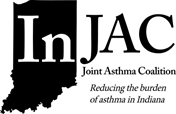 Indianapolis, IN- The Indiana Joint Asthma Coalition is sharing resources and information for clinicians, health care workers, and people with asthma in Indiana in observance of World Asthma Day on May 5, 2021.
Indianapolis, IN- The Indiana Joint Asthma Coalition is sharing resources and information for clinicians, health care workers, and people with asthma in Indiana in observance of World Asthma Day on May 5, 2021.
According to the Asthma and Allergy Foundation of America, asthma is the leading chronic condition in the United States. Approximately 25 million Americans have asthma, or about 1 in 13 people. There is currently no cure for asthma, but there are several treatment options available for those living with the condition.
In Indiana, about 1 in 10 adult Hoosiers has asthma, while the childhood rate is close to about one in 15 children,
Identified key data points highlighting disparities in rates of asthma based on race and ethnicity–Black Non-Hispanics have the highest rates of asthma among both adults and children in Indiana at 12.7% compared to White Non-Hispanic Adults at 9.8%. Black children also have higher rates of asthma at 13% compared to white children at 6.1%. These numbers show the continued need to address issues of health equity.
Among youth, males have higher rates of asthma compared to females at 7.6% compared to 5.4%. Reasons for this difference are not well known, however, the numbers change in adulthood. Adult women have rates at 12.5% versus adult males at 6.9%. Research shows that sex hormones may affect these numbers giving a direction for continued future research on gender differences.
What is Asthma?
The National Heart, Lung, and Blood Institute defines asthma as a chronic (long-term) condition that affects the airways of the lungs. The airways are tubes that carry air in and out of your lungs and if you have asthma, the airways can become inflamed and narrowed at times.
Asthma affects people of all age groups but often starts in childhood. Symptoms of asthma can include tightness in the chest, wheezing and coughing and can range from mild to severe happening daily or intermittently depending on the individual.
Asthma symptoms can be triggered by cold air and allergens. If asthma symptoms worsen, it’s referred to as an asthma attack. The National Heart, Lung, and Blood Institute is a great resource for learning more about asthma, visit their website.
Risk Factors
Environmental asthma risk increases in relation to where an individual lives and the quality of the air they breathe. Proximity to factories with chemical exhaust, second-hand smoke, wood fires, and occupational hazards experienced by people in a variety of workplace situations all contribute to increased risk of developing asthma or worsening an existing diagnosis. Children have little control over the conditions in which they live or go to school, making them more at-risk of developing asthma or suffering increased symptoms. The following risk factors affect vulnerability to asthma:
• Environment or occupation
• Family history and genes
• Medical conditions such as allergies, obesity, and respiratory infections
• Race or ethnicity: African Americans and Puerto Ricans are at higher risk of developing asthma
• Gender: among children, boys are more likely than girls to have asthma and in teens, and adult’s asthma is more likely to affect women
Indiana’s Asthma Efforts
The Indiana Joint Asthma Coalition (InJAC) was first established in 2003 as individuals and organizations interested in reducing the burden of asthma, improving the quality of patient care, reducing environmental triggers and strengthening asthma programming in Indiana. The following InJAC resources are available.
• Resource articles
• Mobissues–free digital booklets about asthma
• Asthma toolkits for schools
The Marion County Public Health Department has resources, including its new website, which provides resources to help patients and their caregivers navigate their condition and control their asthma using self-management education. Online referral for Environmental Health Specialists is also available.
Get Involved
Save the Date—for a free virtual Asthma Summit on Thursday August 26th from 10am-2pm. The conference will highlight strategies to optimize asthma control from a clinical and lay person point with topics for the medical community and individuals living with asthma. If interested in joining the coalition, email cestewar@iu.edu.
InJAC is part of the Connections IN Health project, which is made up of a team of experts focused on some of Indiana’s most chronic conditions, including obesity, asthma, cancer, cardiovascular disease, and diabetes. Please reach out to Courtney Stewart, Lead of the Indiana Joint Asthma Coalition at cestewar@iu.edu for more information about InJAC.
For more information on InJAC and other chronic disease coalitions in Indiana, contact Connections IN Health at cinh@iu.edu or visit their website.
This project was funded, in part, by grant(s) NUE1EH001382, NU58DP006525, and/or NB01OT009281 from the Centers for Disease Control and Prevention and with support from the Indiana Clinical and Translational Sciences Institute funded, in part by Award Number UL1TR002529 from the National Institutes of Health, National Center for Advancing Translational Sciences, Clinical and Translational Sciences Award. The views expressed in written conference materials or publications and by speakers and moderators are solely the responsibility of the author(s) and do not necessarily reflect the official policies or views of the Department of Health and Human Services or the National Institutes of Health nor does mention of trade names, commercial practices, or organizations imply endorsement by the U.S. Government.
